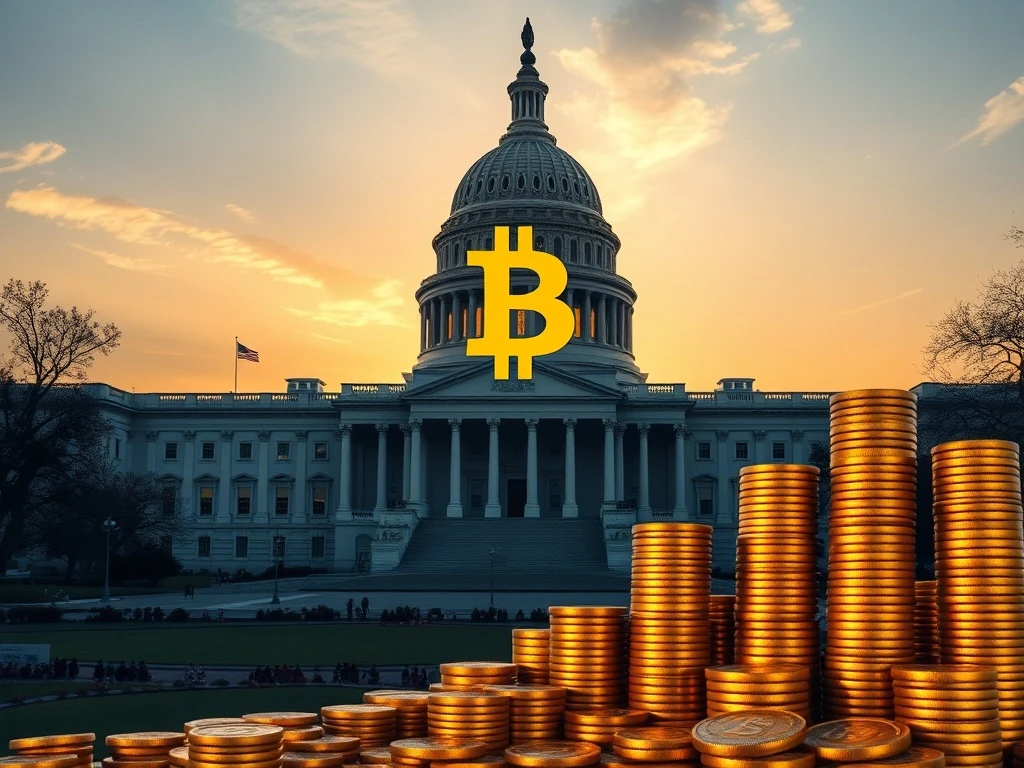Unlocking Potential: US Explores Strategic Bitcoin Reserve with Tariff Surplus

Imagine the United States government holding a significant reserve of Bitcoin. This intriguing possibility has recently gained traction. A compelling new proposal suggests the US could fund a **Bitcoin strategic reserve** by utilizing an unexpected source: the nation’s substantial tariff surplus. This innovative approach aims to bolster national assets without impacting existing budgets, marking a potential shift in **US crypto policy**.
The Bold Proposal for a Bitcoin Strategic Reserve
Adam Livingston, author of “The Bitcoin Age and The Great Harvest,” recently presented a groundbreaking idea. He advocates for the US government to acquire Bitcoin for a strategic reserve. His proposal focuses on a specific funding mechanism: diverting a portion of the monthly tariff receipt surplus. This strategy would create a secure, self-custodied Bitcoin holding.
Livingston’s vision for this reserve includes several critical security features:
- Geographically distributed multi-signature cold storage ensures robust security.
- Proof of reserves provides transparency and verifies holdings.
- A strict budget cap maintains fiscal discipline.
Crucially, this Bitcoin would not be traded, staked, sold, or rehypothecated. It would remain a static, secure asset. This approach aligns with a long-term strategic asset accumulation.
Navigating US Government Bitcoin Acquisition
The concept of government Bitcoin acquisition faces specific hurdles. A US President Trump executive order mandates that any additional Bitcoin acquisition must occur through budget-neutral strategies. This directive shapes the viability of any proposal. It ensures new asset purchases do not burden taxpayers or existing federal programs.
Recently, US Treasury Secretary Scott Bessent provided mixed signals on the issue. Initially, Bessent stated the US government would not purchase new Bitcoin for the strategic reserve. “We’re not going to be buying that, but we are going to use confiscated assets and continue to build that up,” Bessent told Fox Business. However, he quickly clarified his remarks later that day. Bessent affirmed the US government is still “exploring budget-neutral pathways” to accumulate more digital currency. This clarification opened the door for continued discussion on such proposals.
Unlocking Tariff Surplus for Bitcoin Acquisition
Livingston’s proposal directly addresses the budget-neutral requirement. He highlights the significant, unallocated tariff surplus. “As of July, we’ve collected $135.7 billion in customs duties — double last year’s pace,” Livingston explained. He continued, “Let me repeat that we’re sitting on a $70 billion surplus from tariffs, and we haven’t even finished the fiscal year.”
This surplus represents a unique opportunity. It is not tied to existing expenditures like Medicare, entitlements, or debt service. Therefore, it is available for productive new uses. Cumulative receipts show the US government collected approximately $136 billion in customs duties through the 2025 fiscal year so far. This substantial, floating fund could provide the ideal source for a **Bitcoin strategic reserve**.
Alternative Budget-Neutral Strategies for US Crypto Policy
Beyond the tariff surplus, other budget-neutral strategies have emerged for **US crypto policy**. One prominent idea involves revaluing the Treasury’s gold holdings. Currently, these holdings are priced at just $42.22 per troy ounce. However, gold trades on spot markets for about $3,335 per ounce. Revaluing this asset would instantly free up substantial capital without new spending.
Another proposed avenue involves reallocating existing government reserve assets. For instance, the government could sell off oil from the strategic petroleum reserve. The proceeds from such sales could then fund Bitcoin acquisitions. These alternative strategies demonstrate the government’s commitment to exploring diverse, fiscally responsible methods for asset accumulation. They highlight a growing interest in incorporating digital assets into national reserves.
The Broader Implications for US Crypto Policy
Establishing a **Bitcoin strategic reserve** carries profound implications for global finance. It could position the US as a leader in the evolving digital asset landscape. Samson Mow, a prominent figure in the Bitcoin space, has warned that the “US risks being ‘front run’ on Bitcoin reserve by other nations.” This suggests a strategic imperative for early adoption.
A government-held Bitcoin reserve could also:
- Enhance national financial security.
- Diversify existing reserve assets.
- Signal official recognition of Bitcoin’s long-term value.
Such a move would fundamentally alter **US crypto policy**. It would transition from a purely regulatory stance to one of active participation. This could encourage broader institutional adoption and accelerate global Bitcoin integration.
The debate surrounding a US **Bitcoin strategic reserve** continues to evolve. Proposals like Adam Livingston’s offer compelling pathways for **Bitcoin acquisition**. While Treasury Secretary Scott Bessent’s statements reflect caution, the commitment to exploring budget-neutral options remains clear. Whether through tariff surpluses, gold revaluation, or other means, the discussion underscores a growing recognition of Bitcoin’s potential as a national asset. The future of US engagement with digital currencies appears increasingly intertwined with strategic asset management.








